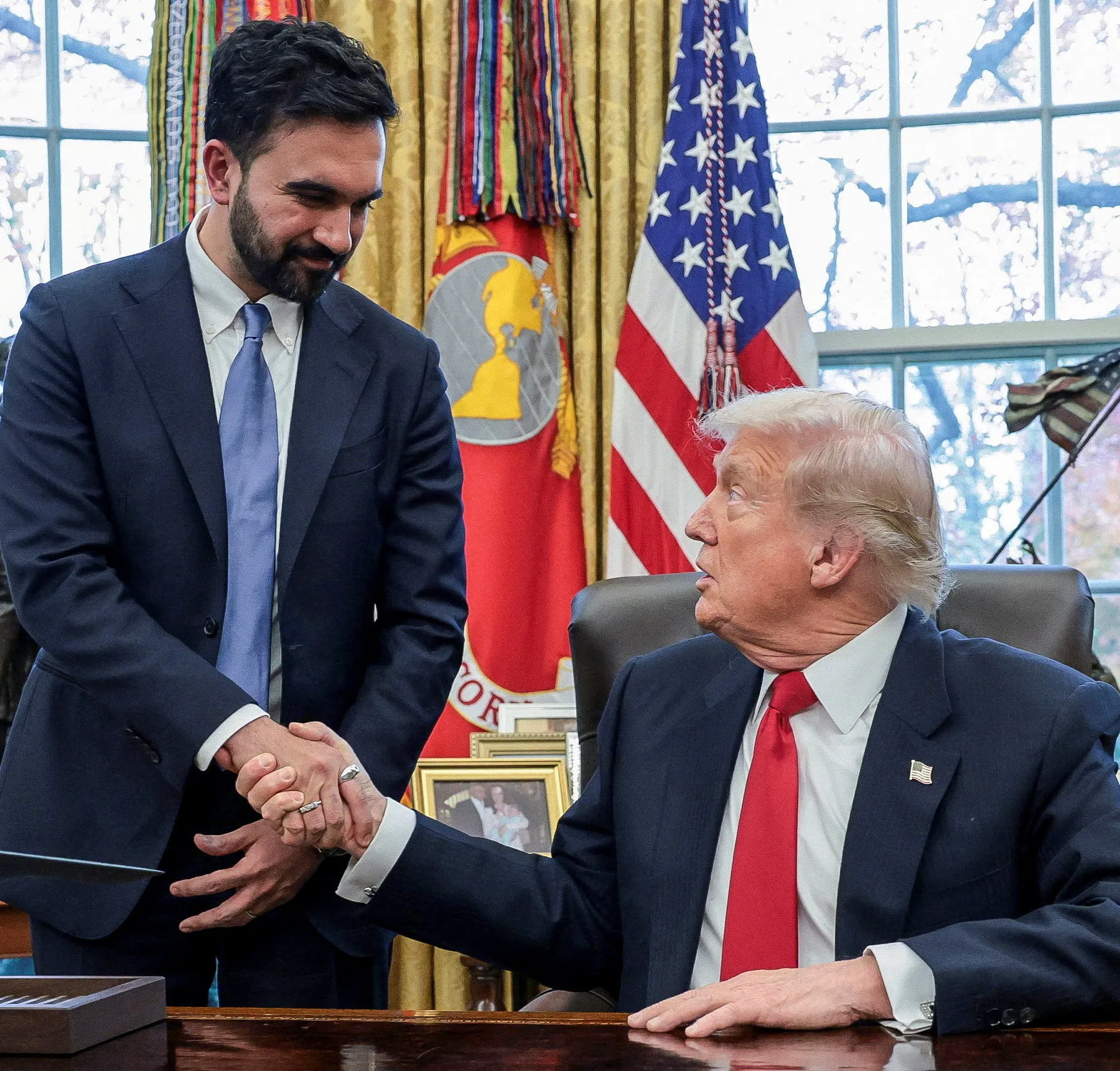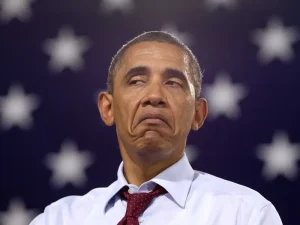In one of the most unexpected turns in recent New York–Washington political relations, President Donald Trump and New York City Mayor-Elect Zohran Mamdani shared a quiet moment of calm, cooperation, and even warm humor during their first face-to-face meeting — a meeting that many expected to be tense, hostile, or painfully short. Instead, it unfolded as one of the more unusual displays of political civility in recent memory, revealing that even two combative figures with months of public friction can find areas of overlap when the stakes involve the future of America’s largest city.
For months, both men exchanged sharp public criticisms, traded jabs over immigration and public safety policy, and framed one another as ideological opposites. Mamdani had called Trump a “fascist” during a campaign moment that quickly went viral. Trump, for his part, repeatedly labeled Mamdani “a 100% Communist lunatic” and suggested that the incoming mayor’s approach to immigration would be so extreme that “we’ll have to arrest him.” Trump even endorsed Andrew Cuomo — Mamdani’s main opponent — the night before the general election, making it very clear how he expected the vote to go.
Given this backdrop, cameras and reporters entered the Oval Office on Friday expecting cold stares, stiff posture, or at the very least a few clipped sentences. Instead, Trump was seated comfortably at his desk, speaking in a surprisingly warm tone as Mamdani stood beside him, smiling. Far from the hostility that defined the summer and fall campaign season, both were relaxed, conversational, and intent on projecting something neither man typically prioritizes: agreement.
“I expect to be helping him, not hurting him,” Trump said with a grin. “A big help.”
The Mayor-Elect responded in kind, acknowledging both differences and newly discovered alignment. “What I really appreciate about the President,” Mamdani said, “is that the meeting we had focused not on disagreements, which there are many, but on the shared purpose we have in serving New Yorkers.”
For a city facing a cost-of-living crisis, a housing crunch, affordability concerns, and growing frustration over safety, the two leaders stressed that some priorities indeed overlap. Even Trump — who has rarely offered praise to a Democratic socialist — nodded to the areas where the two had reached common ground.
“We agree on a lot more than I would have thought,” Trump admitted.
That moment of candor signaled perhaps the most striking shift. Trump even went as far as suggesting he would feel comfortable living in a Mamdani-led New York once again, telling reporters, “Absolutely,” when asked whether the meeting had changed his view.
Mamdani, for his part, emphasized affordability as a central issue — one he insisted could unite conservatives, progressives, and everyone in between. For his campaign, affordability was the connective tissue between his left-wing rhetoric and the everyday struggles of New Yorkers who face soaring rents and rising prices.
“We can transform the lives of eight and a half million people currently struggling under a cost-of-living crisis,” he said. “If we can align on that, then we can deliver concrete results.”
The meeting itself came after Mamdani’s transition team reached out to the White House earlier in the week. He described the outreach as “customary,” saying that every New York mayor-elect meets with the President because the two offices rely on each other for major federal-city coordination. But beyond that, Mamdani insisted he was fulfilling a promise: that he would meet with anyone — even Donald Trump — if it benefited the people of New York.
Trump had signaled his own willingness days earlier. While still referring to Mamdani as a “communist,” the President nonetheless made clear that he wanted “everything to work out well for New York.” On Wednesday night, he confirmed the meeting would take place.
Their time together in the Oval Office also featured an unexpected moment of levity. When a reporter asked Mamdani whether he stood by his campaign-trail remark calling Trump a fascist, Trump lightly nudged the moment away from confrontation. “That’s ok, you can just say yes,” Trump joked, patting Mamdani’s elbow.
It was the type of interaction few observers could have imagined even a month ago.
To understand how dramatic this pivot was, it is worth remembering what preceded it. Mamdani — at 34 years old — upended the establishment by defeating former Governor Andrew Cuomo in the Democratic primary and again in the general election. His victory stunned the old guard of New York politics. A self-identified democratic socialist, he spent months blasting Trump’s immigration policies and promising to resist federal immigration enforcement inside the city. He vowed to be “Donald Trump’s worst nightmare” and to “Trump-proof” New York City.
Trump, meanwhile, openly mocked the idea that Mamdani could govern effectively, repeatedly questioning his competence and warning that a Mamdani victory might lead to withheld federal funds.
Yet despite the public feuding, Mamdani said that affordability remained the issue where the two could realistically collaborate. During a pre-election debate, he outlined the shared priority clearly:
“Donald Trump ran on three promises,” Mamdani said in October. “Creating the largest deportation force in American history, going after political enemies, and lowering the cost of living. If he wants to talk to me about the third piece of that agenda, I will always be ready.”
That message appears to have set the table for Friday’s unexpected equilibrium.
During the Oval Office discussion, Mamdani repeatedly returned to the cost-of-living crisis, pointing out that New Yorkers across the political spectrum — including some Trump voters — were drawn to the President’s messaging on affordability. Trump echoed this, noting that some of his supporters had also backed Mamdani for the same reason.
“Some of his ideas are the same ideas I have,” Trump said.
Trump also defended Mamdani from critics inside his own party, calling him “rational,” and dismissing certain Republican attacks as exaggerated. “I met with a man who is a very rational person,” Trump said. “I met with a man who really wants to see New York be great again.”
That line — perhaps unintentionally — mirrored Trump’s own signature slogan, signaling a level of political acknowledgment that goes beyond cordiality.
Whether this moment of goodwill represents a long-term partnership or a temporary pause in hostilities remains to be seen. But the symbolism of two ideological opposites finding common ground, even briefly, is striking in today’s political climate.
For Trump, the encounter allowed him to show a rare moment of presidential magnanimity — a signal to moderate voters that despite combative rhetoric, he can still engage collaboratively. For Mamdani, the meeting displayed pragmatism, maturity, and a willingness to operate beyond ideological lines when it comes to delivering for New Yorkers.
And for New York City, the meeting offered something else: a glimmer of possibility that the federal government and the incoming mayor can work together on issues that affect millions of residents.
Even if the two men resume their political sparring down the road, the Oval Office meeting demonstrated that there are moments — even in modern American politics — where cooperation can briefly eclipse conflict.
It may not last. It may not change their long-term relationship. But for a single afternoon, President Donald Trump and Mayor-Elect Zohran Mamdani showed that even political rivals can find unexpected overlaps when faced with the shared responsibility of governing.










